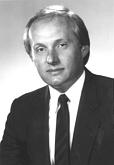Roy E. Wansik
For his outstanding leadership of one of the world's premier chemical distribution and environmental services companies, the Schools of Engineering are proud to present the Distinguished Engineering Alumnus Award to Roy E. Wansik.
President and Chief Executive Officer
Pakhoed Corporation
BSCE 1966, MSCE 1967

On Purdue
I began my engineering education living at home and attending the Purdue Calumet campus. Upon transferring to West Lafayette, I entered the co-op program with Pullman-Standard, the former rail car manufacturing company that built passenger cars and freight cars. That experience, along with several Purdue scholarships, not only allowed me to pay for my education, but it was very hands-on and practical, complementing the classroom education. I can't say enough good things about the co-op program, and I credit its combination with sound civil engineering for much of the progress I have made.
Engineering classes were obviously a lot of hard work, as they are today. There were 7:30 classes on Saturday mornings and even classes on some holidays-once we listened to the Indy 500 race in class. Two professors in particular were noteworthy and influential, and both could be said to have been of the old school. One was Professor Frank Stubbs, who was my adviser for the civil engineering construction and engineering management master's program. I was one of the first students in that program, and he was both encouraging and helpful. Professor B. B. Lewis was another. I had several classes with him as the only student. He could best be described as a wise taskmaster who stood up for the values of hard work and dedication.
The academic side of the Purdue engineering experience certainly ranks among the best in the country, but even when I graduated in 1966, the practical side was as important as the theoretical side, an example being sanitary engineering. If I could describe what's been most beneficial to me from my Purdue engineering education,
I would say it's the very positive work ethic that's part of the program. Purdue's engineering education instills discipline, a thorough thought process, organizational ability, planning skills, and common sense. These parts of the basic engineering education are applicable not only to engineering but to a wide range of business activities and functions.
On his career
As a student I did not have a specific vision for a career, as many others did, but if there was a general vision, it centered on engineering. However, I am not surprised that my career has taken me into management, because I was always interested in a variety of activities. Thinking back, I probably did not see myself continuing to do engineering exclusively.
In the positions I've held, obviously the challenges and goals achieved have been satisfying. However, as a manager I've always surrounded the organization and myself with good, competent people. Together as a team, regardless of job or company, all of us have been able to have career advancement, helping everyone achieve their career goals. I am happy with my own career, but equally important to me are the accomplishments of the people I've been involved with. Given the opportunity, support, and resources, individuals will and can rise above their expectations, as I have.
On higher education
Higher education has to produce well-balanced, well-rounded individuals. My own view is that there is certainly a need for highly specialized individuals and functions, but today's global market needs well-balanced, technically educated, all-around problem solvers. Higher education should focus on developing people who can analyze situations, attack problems, set priorities, and then go on and find technical solutions.
Students today are better developed in their ability to sell, to write, to make economic analyses, and to communicate than we were 30 years ago. The curriculum at that time was not structured to develop those skills. At the same time, do I think there's room for improvement? Definitely yes. The further development of engineers' interpersonal skills will be a requirement in the future.
- 1984:
- President and chief executive officer, Pakhoed Corp. Oversees corporate management of holding company and presides over three operating divisions: Paktank Corp., EMPAK Inc., and Pakhoed Dry Bulk Terminals Inc. From previous position to the present, has led the chemical storage and distribution and environmental services company to 11 consecutive years of increased earnings. Serves on strategic committee for the 400-year-old parent company, Royal Pakhoed N.V., headquartered in Rotterdam, the Netherlands.
- 1982:
- President, Paktank Corp.
- 1979:
- President of the Mundy Companies, a provider of contract maintenance and construction services to the refining, petrochemical, and chemical industry.
- 1976:
- Executive vice president.
- 1975:
- Senior vice president, operations and marketing.
- 1973:
- Vice president, operations.
- 1967:
- Exxon project manager and project engineer in operations management, maintenance, and construction supervision.
BSCE 1966, MSCE 1967, Purdue.
